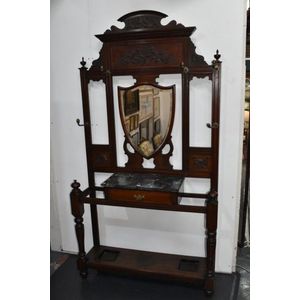Blackwood Hall Stand with Carved Back and Brass Coat Racks
Edwardian blackwood hall stand with carved back, shield shaped mirror, brass coat racks and single drawer below marble top
You must be a subscriber, and be logged in to view price and dealer details.
Register Now to view actual auction price for this item.
- Edwardian - The Edwardian period of English furniture and decorative arts design is named for Edward VII (1841 – 1910) who was King of the United Kingdom and the British Dominions and Emperor of India for the brief period from 1901 until his death in 1910. It follows the Victorian period, in turn was followed by the Art Nouveau and Art Deco styles. In Australia, designs of this period are also known as being in the Federation style.
- Blackwood - One of the best known and most widely used Australian timbers, blackwood (acacia melanoxylon), is a member of the Acacia (wattle) family and grows in eastern Australia from about Adelaide in South Australia, as far north as Cairns in Queensland.
The largest, straightest and tallest trees come from the wet forest and swamps of north-west Tasmania where it is grown commercially.
Blackwood timber colours range across a wide spectrum, from a very pale honey colour through to a dark chocolate with streaks of red tinge.
The hardwood timber has been commonly used in the production of furniture, flooring, and musical instruments in Australia from the late 19th century. However, the straight grain timber is not the most prized or valuable, that honour falls to blackwood with a wavy, fiddleback pattern, which is used both in the solid and as a veneer. Fiddleback was only used on the finest examples of furniture.
This item has been included into following indexes:
- hallstands, made of
- hallstands, period - Edwardian 34
